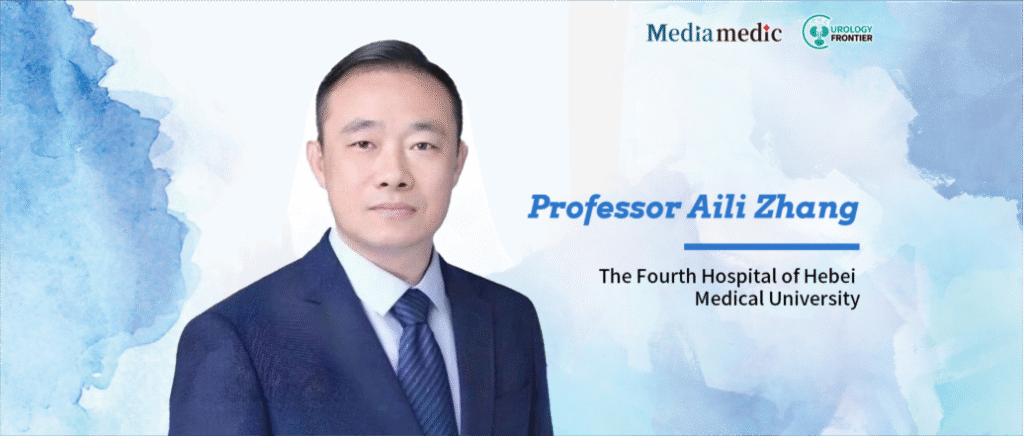
2025 Pujiang Uro-Oncology Academic Conference
Editor’s Note: The 2025 Pujiang Uro-Oncology Academic Conference brought together leading domestic and international experts in genitourinary oncology to share the latest research progress and clinical practice in renal cell carcinoma (RCC) and other urological cancers. Based on her conference lecture, Professor Aili Zhang offers a comprehensive analysis and interpretation of the key RCC studies presented at the 2025 ASCO Annual Meeting. 01. Postoperative Adjuvant Therapy: Pembrolizumab Establishes a New Milestone in Overall Survival Benefit
For a long time, postoperative adjuvant therapy for high‑risk renal cell carcinoma has been a clinical challenge. Previous targeted adjuvant trials—aside from the S‑TRAC study, which showed disease‑free survival (DFS) benefit with sunitinib—mostly reported negative results. The emergence of immunotherapy has brought new hope.
Professor Aili Zhang focused on the 5‑year follow‑up results of the KEYNOTE‑564 study evaluating pembrolizumab (a PD‑1 inhibitor) as adjuvant monotherapy after nephrectomy. New data show that pembrolizumab not only sustains DFS improvement but, more importantly, for the first time significantly prolongs overall survival (OS).
“Improvement in OS is the ultimate indicator of therapeutic success,” said Professor Zhang. “This result is truly inspiring—it represents a genuine breakthrough that has reshaped the landscape of adjuvant therapy for high‑risk renal cancer.”
Subgroup analyses demonstrate consistent DFS and OS benefit across age, sex, tumor stage, grade, and metastatic status. On the strength of this evidence, the European Society for Medical Oncology (ESMO) and the Chinese Society of Clinical Oncology (CSCO) have both incorporated pembrolizumab into their recommended adjuvant treatment guidelines, officially ushering in the era of immunotherapy for adjuvant RCC.
02. Neoadjuvant Therapy: Targeted–Immunotherapy Combinations Bring New Hope to High‑Risk and Tumor Thrombus Patients
Historically, neoadjuvant therapy in RCC has been exploratory, aiming to downstage primary tumors or downgrade tumor thrombi preoperatively to improve resectability and safety. Two studies reported at ASCO 2025 provide stronger evidence supporting neoadjuvant strategies.
First, the long‑term follow‑up of the JAVELIN study investigated axitinib plus avelumab as neoadjuvant therapy for localized RCC at high risk of recurrence. After more than 50 months of follow‑up, median DFS reached 25.1 months, while OS had not yet been reached.
“Although this was a single‑arm study,” Professor Zhang explained, “its results compare favorably with historical controls. More importantly, responders to neoadjuvant therapy experienced significantly longer DFS and OS than non‑responders, further confirming the clinical value of this regimen.”
Another notable study from China evaluated axitinib plus toripalimab as neoadjuvant therapy for RCC with inferior vena cava tumor thrombus—a high‑risk surgical scenario. The objective response rate (ORR) reached 37.5%, and 45% of patients achieved tumor thrombus downgrading.
“Although neoadjuvant response did not directly translate into differences in PFS or OS,” noted Professor Zhang, “the ability to downgrade thrombi substantially simplifies surgery, enhances operative safety, and lays a solid foundation for subsequent comprehensive treatment.”
03. First‑Line Therapy for Advanced Disease: Targeted–Immunotherapy Combinations Continue to Extend Survival
In advanced RCC, targeted plus immunotherapy combinations constitute the standard of care in the first‑line setting. The CheckMate 912 study presented long‑term outcomes comparing cabozantinib plus nivolumab versus sunitinib. After 67.6 months (over five years) of follow‑up, the combination continued to deliver sustained PFS and OS benefits.
Survival improvements were seen regardless of liver, lung, or bone metastases, with the greatest benefit observed among intermediate‑ and poor‑risk IMDC subgroups.
“These results reinforce the role of cabozantinib plus nivolumab as a cornerstone first‑line regimen for advanced RCC—particularly in intermediate‑ and high‑risk patients,” Professor Zhang emphasized. “They also underscore the importance of precise risk stratification to maximize efficacy while managing toxicity.”
This regimen has been incorporated into the latest CSCO Guidelines for the Diagnosis and Treatment of Renal Cancer.
04. Rare Subtypes: Targeted–Immunotherapy Shows Emerging Potential and Fills Evidence Gaps
Due to the rarity of certain RCC subtypes, high‑quality clinical data have historically been scarce. Encouragingly, ASCO and ASCO‑GU 2025 reported progress in this area.
In TFE‑rearranged RCC—a highly aggressive subtype affecting younger patients—a small study of axitinib plus nivolumab showed preliminary improvements in PFS and OS compared with monotherapy, offering hope for this challenging population.
Another study led by West China Hospital (Sichuan University) targeted advanced non‑clear cell RCC (nccRCC), using the innovative combination of cadonilimab (a PD‑1/CTLA‑4 bispecific antibody) plus axitinib. The objective response rate reached 55%, and the disease control rate 95%—a remarkable outcome for nccRCC.
“Such robust efficacy in non‑clear cell RCC is unprecedented,” said Professor Zhang. “This breakthrough result significantly strengthens our resolve to tackle difficult RCC subtypes and begins to fill long‑standing therapeutic gaps.”
05. Summary and Outlook
Summarizing RCC advances presented at ASCO 2025—from the first demonstration of OS benefit in the adjuvant setting, to growing neoadjuvant feasibility, to continued optimization of first‑line therapy and progress in rare subtypes—systemic treatment for RCC is rapidly moving toward a more precise and efficient era.
Future research should prioritize predictive biomarkers to guide individualized decision‑making and continued optimization of combination strategies—including ideal pairings and timing. “These ASCO data bring new hope to patients with RCC worldwide,” concluded Professor Zhang, “and they also showcase the growing contribution of Chinese investigators to global oncology—ensuring more Chinese voices are heard on the world stage.”
— Professor Aili Zhang


